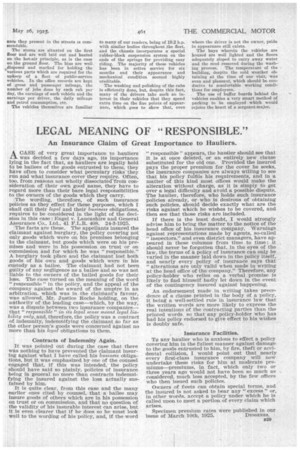LEGAL MEANING OF "RESPONSIBLE."
Page 13

If you've noticed an error in this article please click here to report it so we can fix it.
An Insurance Claim-of Great Importance to Hauliers.
ACASE of very great importance to hauliers was decided a few days ago, its importance lying in the fact that, as hauliers are legally held to be bailees of the goods entrusted to them, they have often to consider what pecuniary risks they. run and what insurance cover they require. Often, too, from reasons not wholly dissociated-from consideration of their own good name, they have to regard more than their bare legal responsibilities to the owners of the goods which they carry.
The wording, therefore, of such insurance policies as they effect for these purposes, which I Shall call their legal And their business obligations, requires to be considered in the light of the decision in this case : Engel v. Lancashire and General Assurance Co., Ltd., 41 F.L.R. 408. 24-3-1925.
The facts are these. The appellants insured the claimant against burglary, the policy covering not only goods which were on his premises belonging to the claimant, but goods which were on his premises and were in his possession on trust or on commission and for which he was "responsible." A burglary took place and the claimant lost both goods of his own and goods which were in his custody as a bailee, The claimant had not been guilty of any negligence as a bailee and so was not liable to the owners of the bailed goods for their loss. The case turned on the meaning of the,word " responsible" in the policy, and the appeal of the company against the award of the umpire in an arbitration, which was in the claimant's favour, was allowed. Mr. Justice Roche holding, on the authority of the leading case—which, by the way, was a dispute between two insurance companies--that " responsible " in its legal sense meant legal ha. bility only, and, therefore, the policy was a contract of indemnity, indemnifying the claimant so far as the other person's goods were concerned against no more than his legal obligations to them.
Contracts of Indemnity Again.
It was pointed out during the ease that there was nothing to have prevented the claimant insuring against what I have called his business. obligations, but it was emphasized by one of the counsel engaged that, if . this Was intended, the Polley should have said so plainly, policies of insurance being in general no more than contracts indemnifying the insured against the loss actually sustained by him.
It is quite clear, from this case and the many earlier ones cited by counsel, that a bailee May insure goods of others which are in his possession on trust or on Commission, and that no question Of the validity of his insurable interest Can arise, but It is even clearer that if he does so he must look well to the wording of his policy, and if the word
" responsible appears, the hau-lier should see that it is at once deleted, or an entirely new clause substituted for the old one. Provided the insured pays the proper premium for the cover he seeks, the insurance companies are always willing to see that his policy fulfils his requirements, and in a matter of this kind most offices would make the• alteration without charge, as it is simply to get over a legal difficulty and avoid a possible dispute. The haulier, therefore, who holds such insurance policies already, or who is desirous of obtaining such policies, should decide exactly what are the risks against which he wishes to be covered, and then see that those risks are included.
If there is the least doubt, I would strongly advise him to bring the matter to the notice of the head office of his insurance company. Warnings against representations made by agents, so-called "inspectors." and even district managers, have appeared in these columns from time to time it should never be forgotten that, in the eyes of the law, the terms of a policy of insurance can only be varied in the manner laid down in the policy itself, and nearly every policy of insurance says that "alterations are only valid when made in writing at the head office of the company." Therefore, any policy-holder who relies on a verbal promise is likely to find himself, badly let down in the event of the contingency insured against happening.
An endorsement made iii writing takes precedence of a clause printed in the body of a policy, It being a well-settled rule in insurance law that the written words are more likely to express the real intentions of the contracting parties than the printed words, so that any policy-holder who has had his policy endorsed to give effect to his wishes is doubly safe.
, Insurance Facilities.
To any haulier who Is anxious to effect a policy covering him in the fullest manner against damage to the goods entrusted to him, by fire, theft or accidental collision, I would point out that nearly every first-class insurance company will now undertake these risks for him at moderate premiums—premiums, in fact, which only two or three years ago would not have been so much as considered, much less accepted, by the few offices who then issued such policies.
Owners of fleets can obtain special terms, and the insured is not asked to bear any " excess " or, in other words, accept a policy under which he is called upon to meet a portion of every claim which arises.
Specimen premium rates were published in our issue of March 10th, 1925. DIOGENE8.
































